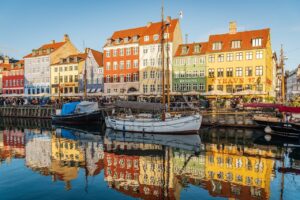Explore the pinnacle of happiness in 2024 with our compilation of the 10 happiest countries in the world. Discover where joy and contentment thrive on a global scale.
Happiness is a universal desire, and societies around the world strive to create conditions that foster joy and contentment among their citizens. But how do we measure happiness? Is it possible to rank countries based on their levels of happiness? These are questions that have gained increasing attention in recent years.
The Top 10 Happiest Countries In The World In 2024
As of 2024, the top 10 happiest countries in the world are a diverse mix of nations from different regions. These countries have consistently ranked highly in terms of happiness and have implemented policies that prioritize the well-being of their citizens. Let’s take a closer look at each of these countries and the factors that contribute to their happiness ranking.
1. Finland: A Strong Social Support System and High Quality of Life

PHOTO: PIXABAY
Finland will take the top spot as the happiest country in the world in 2024. Known for its stunning natural landscapes and high standard of living, Finland excels in various factors that contribute to happiness.
One of the key factors is its strong social support system that provides a safety net for its citizens. Additionally, Finland places a strong emphasis on education, which contributes to a high level of literacy and opportunities for personal growth.
The country’s commitment to gender equality and low levels of corruption also play a significant role in its happiness ranking.
2. Denmark: A Model of Social Welfare and Trust

PHOTO: PIXABAY
Denmark consistently ranks among the happiest countries in the world, and 2024 is no exception. The country’s social welfare system is a key factor in its happiness ranking.
Citizens have access to comprehensive healthcare, education, and social security, which contributes to a sense of security and well-being. Denmark is also known for its high levels of trust and social cohesion, fostering a strong sense of community.
The Danish concept of “hygge,” which emphasizes cosiness and togetherness, further enhances the happiness of its citizens.
3. Switzerland: Prosperity and Quality of Life

PHOTO: PIXABAY
Switzerland is renowned for its high standard of living and quality of life. The country’s strong economy, low unemployment rate, and high-income levels contribute to its happiness ranking.
Switzerland also places great importance on environmental sustainability, which adds to the well-being of its citizens. With its picturesque landscapes and a strong sense of cultural identity, Switzerland offers a harmonious balance between work and leisure, fostering a high level of contentment among its population.
4. Iceland: Natural Beauty and Resilience

PHOTO: PIXABAY
Iceland, with its breathtaking landscapes and natural wonders, ranks among the happiest countries in the world. The country’s small population and strong community ties contribute to a sense of belonging and social support.
Iceland’s resilience in the face of natural disasters, such as volcanic eruptions and earthquakes, is also a testament to the strength and happiness of its people. With a high life expectancy and low levels of pollution, Iceland offers its citizens a high quality of life and a strong connection to nature.
5. Netherlands: A Progressive and Inclusive Society

PHOTO: PIXABAY
The Netherlands is known for its progressive policies and inclusive society, making it one of the happiest countries in the world. The country places a strong emphasis on individual freedom and personal development, allowing its citizens to thrive both personally and professionally.
The Netherlands also prioritizes environmental sustainability, with a focus on renewable energy and cycling infrastructure. Its high level of social tolerance and acceptance of diversity contribute to a sense of belonging and well-being among its population.
6. Sweden: Equality and Work-Life Balance

PHOTO: PIXABAY
Sweden consistently ranks as one of the happiest countries in the world, thanks to its commitment to equality and work-life balance. The country’s generous parental leave policies, affordable childcare, and flexible working hours allow its citizens to prioritize both their professional and personal lives.
Sweden also places great importance on gender equality and social justice, providing a strong sense of fairness and well-being. With its beautiful landscapes and a strong sense of community, Sweden offers its citizens a high quality of life and opportunities for personal fulfilment.
7. Germany: Economic Prosperity and Cultural Richness

PHOTO: PIXABAY
Germany, with its strong economy and cultural richness, ranks among the happiest countries in the world. The country’s low unemployment rate, high-income levels, and quality healthcare contribute to its citizens’ overall well-being.
Germany’s commitment to environmental sustainability and renewable energy further enhances its happiness ranking. With a rich history, vibrant arts scene, and world-class educational institutions, Germany offers its citizens a high standard of living and a sense of cultural fulfilment.
8. New Zealand: Natural Beauty and Resilient Spirit

PHOTO: PIXABAY
New Zealand’s stunning landscapes and resilient spirit contribute to its ranking as one of the happiest countries in the world. The country’s commitment to environmental sustainability and conservation fosters a deep connection to nature and a sense of well-being.
New Zealand’s strong social support systems, including universal healthcare and affordable education, contribute to its citizens’ overall happiness. With a diverse and inclusive society, New Zealand offers its residents a high quality of life and opportunities for personal growth.
9. Austria: Quality of Life and Cultural Heritage

PHOTO: PIXABAY
Austria’s high quality of life and rich cultural heritage make it one of the happiest countries in the world. The country’s commitment to social welfare, healthcare, and education ensures that its citizens have access to the resources they need to thrive.
Austria’s stunning landscapes, historic cities, and vibrant arts scene contribute to a sense of cultural fulfilment and well-being. With its emphasis on work-life balance and a strong sense of community, Austria offers its residents a high level of happiness and contentment.
10. Canada: Natural Beauty and Multiculturalism

PHOTO: PIXABAY
Canada, with its vast landscapes and multicultural society, ranks among the happiest countries in the world. The country’s commitment to inclusivity, diversity, and social justice contributes to a strong sense of belonging and well-being among its citizens.
Canada’s universal healthcare system, affordable education, and high standard of living further enhance its happiness ranking. With its pristine natural beauty and a strong sense of community, Canada offers its residents a high quality of life and opportunities for personal fulfilment.
Factors Considered In Determining The Happiness of A Country
Determining the happiness of a country involves considering a wide range of factors.
- Income is one important factor, as it provides individuals with the means to meet their basic needs and enjoy a certain standard of living.
- Social support is another crucial factor. Strong social connections and supportive relationships contribute to a sense of belonging and well-being. Countries that prioritize social cohesion and invest in community infrastructure tend to have higher levels of happiness.
- Other factors include life expectancy, freedom, generosity, and perceptions of corruption.
Methodology Used To Determine The Happiest Countries In World Happiness Report
Measuring happiness on a global scale requires a robust methodology that accounts for cultural differences and ensures accurate and reliable results. The most widely used measure of happiness is the World Happiness Report, which is published annually by the United Nations.
The World Happiness Report uses data from the Gallup World Poll, which surveys individuals in over 150 countries. The survey asks participants to rate their overall life satisfaction on a scale from 0 to 10. The data is then analyzed alongside various socioeconomic indicators to determine the happiest countries in the world.
The report also takes into account other happiness factors such as GDP per capita, social support, healthy life expectancy, freedom to make life choices, generosity, and perceptions of corruption.
So, by prioritizing happiness and well-being, these countries have created environments that foster joy, contentment, and a sense of purpose among their citizens. As we continue to strive for a better world, it is crucial to recognize the significance of happiness and work towards creating societies where joy and contentment reign.
Discover the happiness within yourself and explore the world’s happiest countries. Take a step towards a happier future by prioritizing your well-being and seeking out experiences that bring you joy and contentment.

